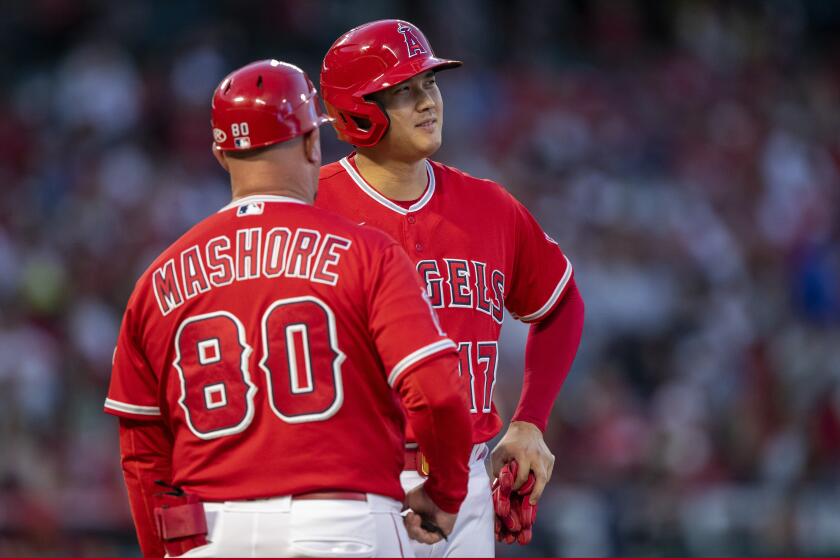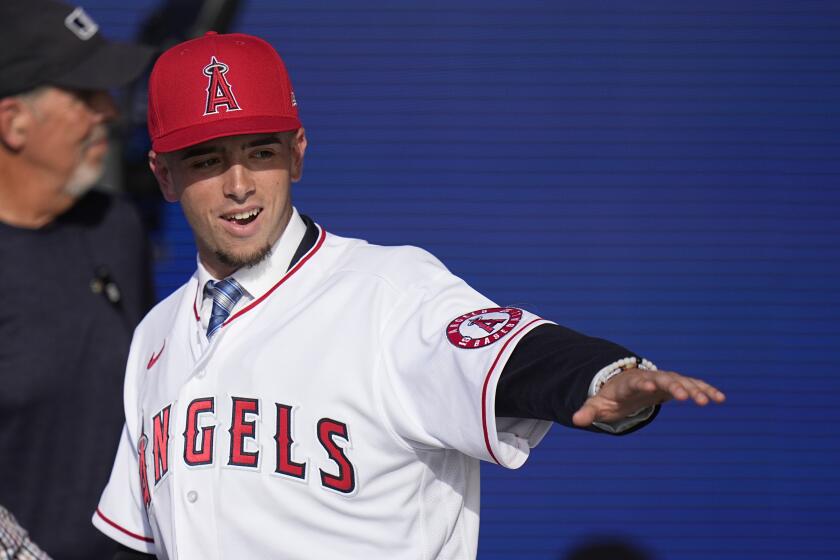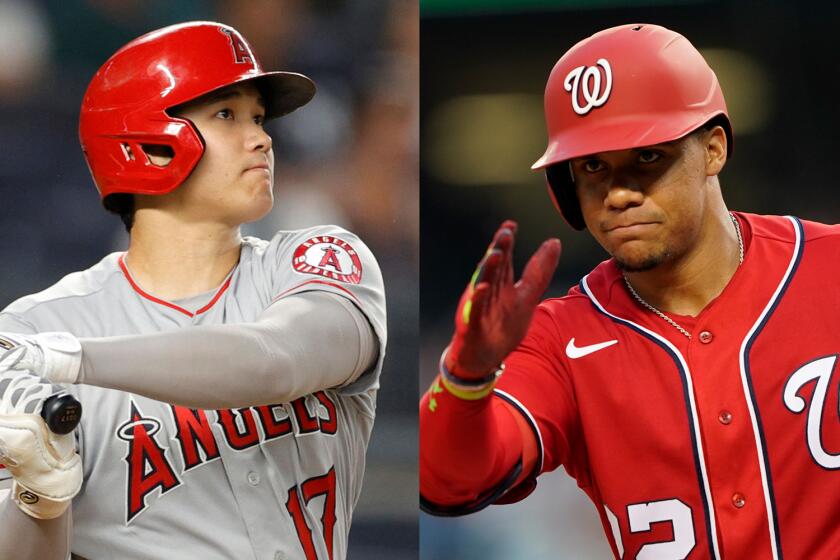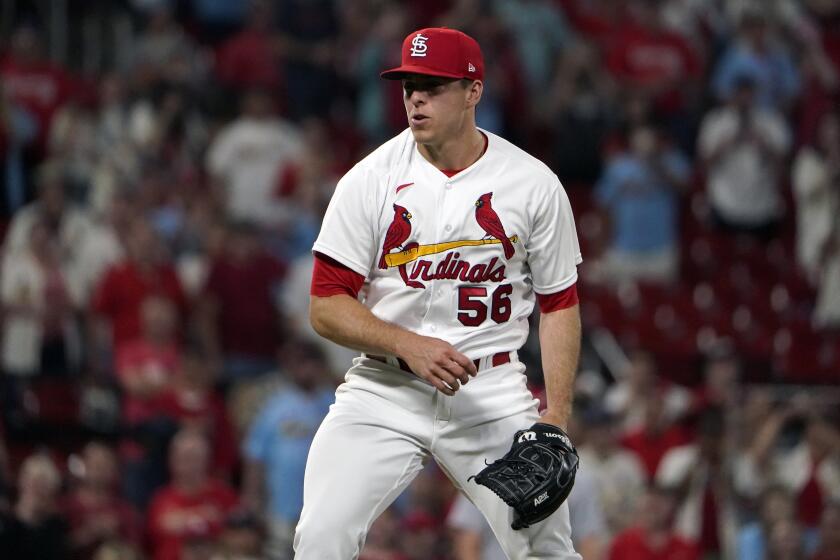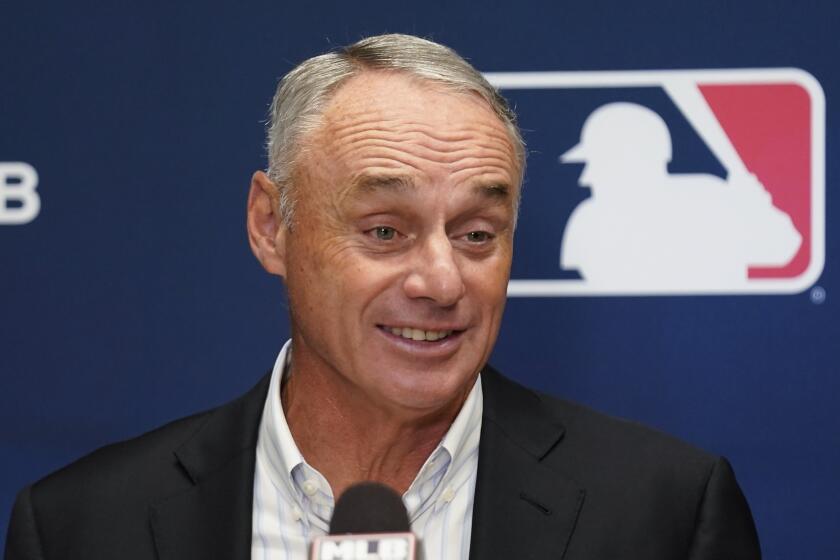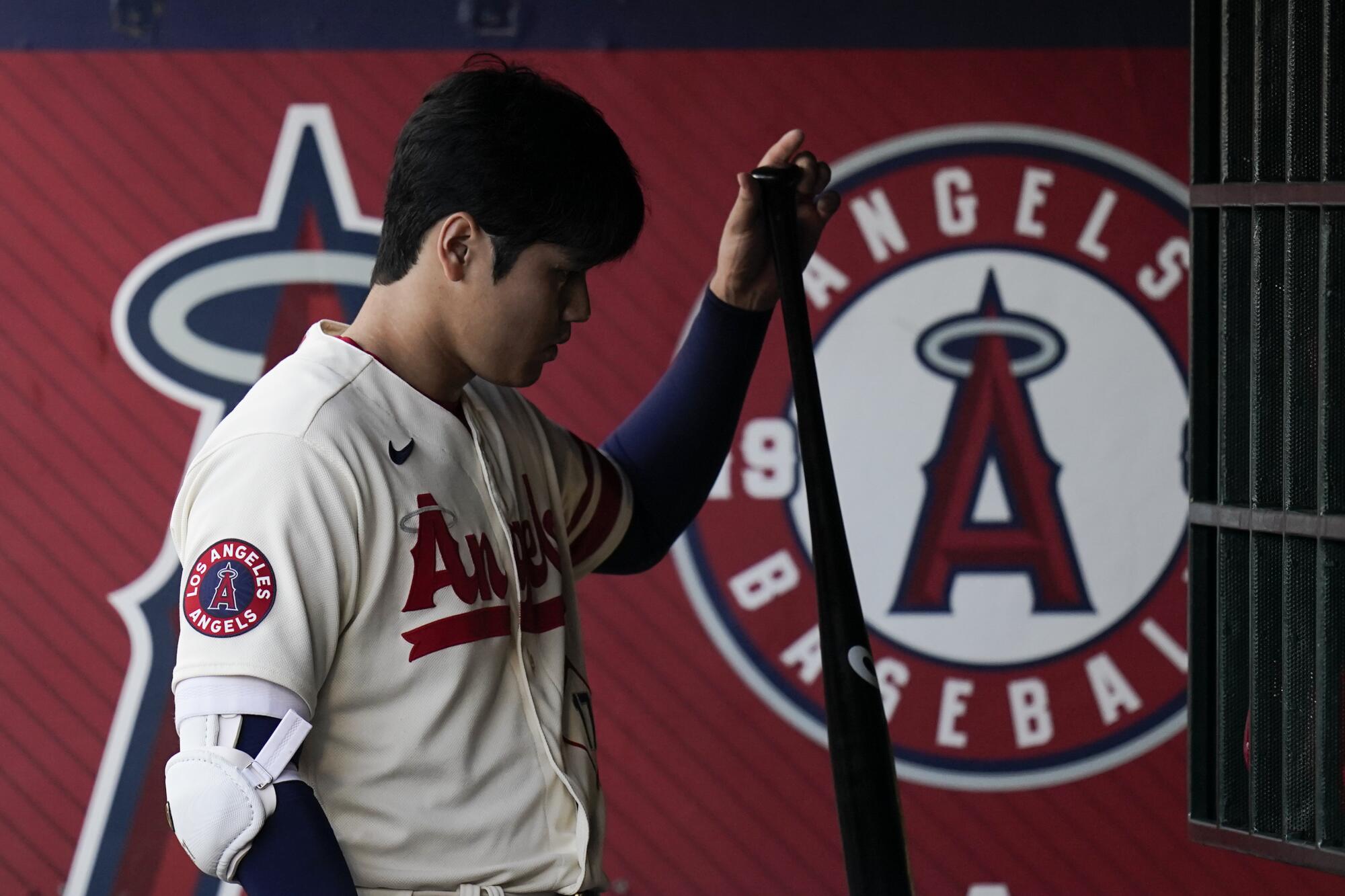
- Share via
The Angels couldn’t have scripted a better opening act to this season, going 27-17 and sitting one game behind the American League West-leading Houston Astros on May 24.
A rejuvenated offense ranked among baseball’s top four teams in runs, homers and on-base-plus-slugging percentage through 44 games. A deeper pitching staff ranked seventh in ERA and second in WHIP (walks plus hits per innings pitched).
Mike Trout, Shohei Ohtani and Anthony Rendon were in the lineup together after Trout and Rendon missed most of 2021 because of injuries. The top half of the rotation — Ohtani, Noah Syndergaard and Michael Lorenzen — looked stout, and young left-handers Patrick Sandoval and Reid Detmers showed promise.
New setup men Aaron Loup and Ryan Tepera were dealing in front of closer Raisel Iglesias. Shortstop Andrew Velazquez, filling in for the injured David Fletcher, looked like a Gold Glove candidate.
Hernández: Shohei Ohtani wants to win and can’t in Anaheim, but the Angels still can’t trade him
Shohei Ohtani has long planned every step of his career. His unwillingness to commit to the struggling Angels should make the franchise nervous.
As a strong start morphed into a solid six-week run — a sample size seemingly too large for the Angels to be considered a fluke — fans hardened by six straight losing seasons began to believe the seven-year playoff drought could finally end.
Those hopes were boosted by a dramatic three-game set from May 8-10, when Rendon hit a walk-off RBI single against Washington, Ohtani hit his first career grand slam against Tampa Bay and Detmers threw a no-hitter against the Rays.
Then, it was as if a trap door flew open and swallowed the entire team whole.
The Angels stumbled and bumbled their way to 14 straight losses from May 25 to June 8, a franchise-record streak that led to the June 7 firing of manager Joe Maddon and triggered a two-month tailspin they have been unable to stop.
The Angels went a major league-worst 12-36 from May 25 through the All-Star break to fall 20½ games behind the Astros in the division and 10½ games back in the wild-card standings entering Friday’s second-half opener at Atlanta.
After selecting 20 pitchers last year, the Angels took a varied mix of players in the 2022 MLB draft, starting with shortstop Zach Neto.
They have three victories since June 29 — all with the incomparable Ohtani on the mound — a one-win-a-week pace that would be great if the Angels were an NFL team.
But the baseball season is 162 games, a six-month grind that separates contenders from pretenders, and the Angels seem shell-shocked by their rapid descent from the former to the latter, a collapse so sudden and complete they are on a pace to lose 93 games despite employing two of the game’s best players.
“It’s really bizarre,” first baseman Jared Walsh said of the nosedive. “After the Detmers no-hitter, we were really flying high. It’s all the more frustrating because we know that’s in there, but we’ve been struggling since then.
“We have to figure out how to get back to that formula, where we rattle off some wins, get confident, maybe put some pressure on other teams in the league and see what happens at the end of the year.”
What happened?
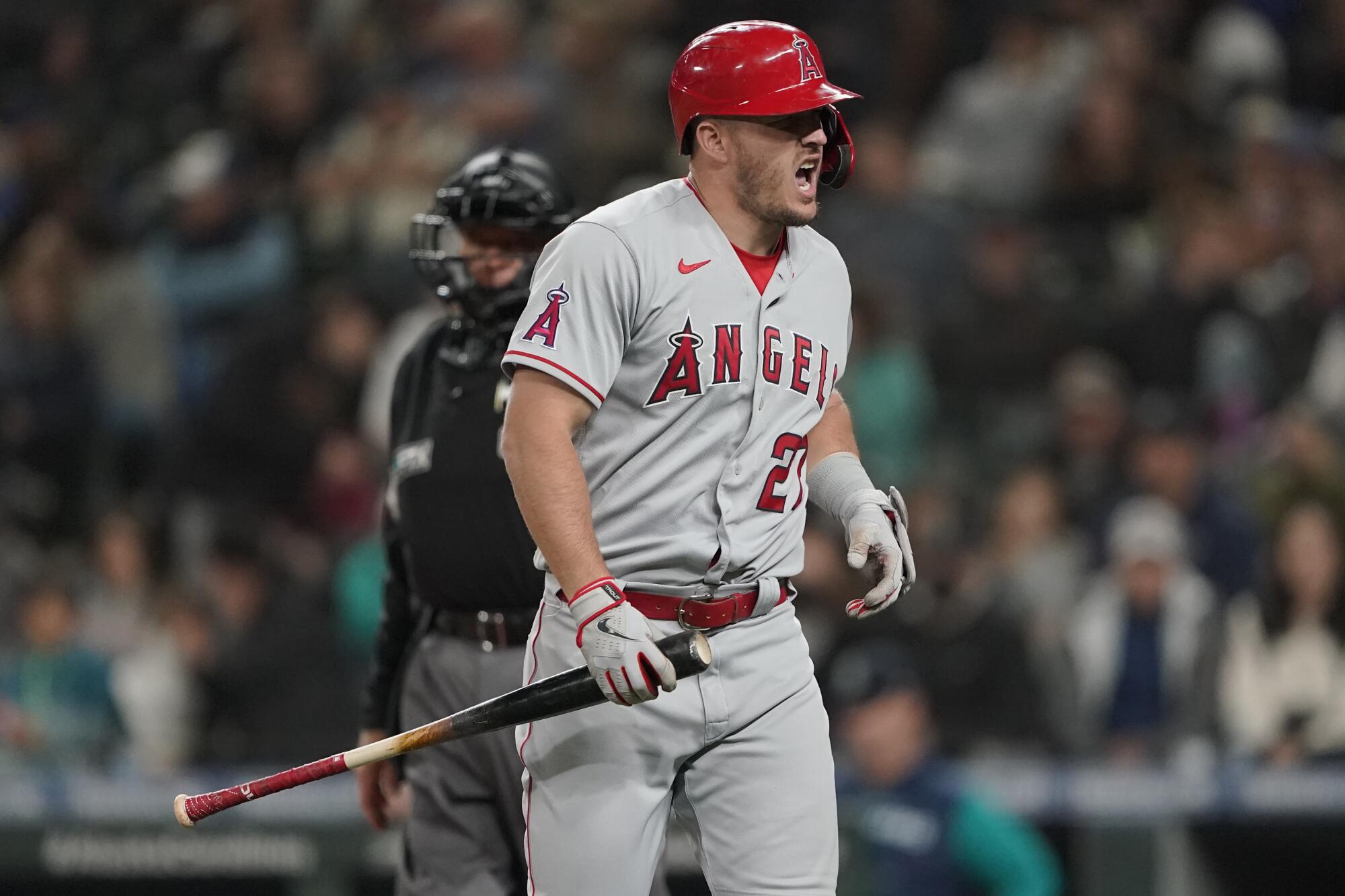
“I mean, there’s no other way to slice it. You lose 14 games in a row, it’s gonna hurt your confidence.”
— Jared Walsh, Angels first baseman
The season turned when the Angels were swept in a four-game series by the Toronto Blue Jays at home from May 26-29, blowing late leads in two games and losing Rendon, their third baseman and cleanup batter, to a right wrist injury.
Trout and Ohtani went cold during an ensuing six-loss trip to New York and Philadelphia, Trout enduring a career-worst 0-for-26 skid and Ohtani batting .191 (nine for 47) with four RBIs during the 14-game streak.
The trip ended with a devastating 9-7 loss to the Phillies in which Iglesias gave up a tying grand slam to Bryce Harper in the eighth inning and Jimmy Herget gave up a walk-off three-run homer to Bryson Stott in the ninth.
The Angels returned home, and in the middle of three more losses — two by 1-0 scores — to Boston, they lost their manager, fiery third-base coach Phil Nevin replacing the more laid-back Maddon on an interim basis.
The losing streak came to a merciful end with an Ohtani-led 5-2 win over the Red Sox on June 9, but the swagger the Angels developed during the first six weeks was gone.
“Hell yeah,” Walsh said, when asked if the losing streak crushed the team’s confidence. “I mean, there’s no other way to slice it. You lose 14 games in a row, it’s gonna hurt your confidence.”
Once the Angels start negotiating with Shohei Ohtani on a new deal, the franchise should take the same approach the Nationals did with Juan Soto.
The trends that developed during the streak continued for two months. The Angels would pitch well one night, only to have the offense disappear. They’d bunch some hits and runs together, and the pitching would falter. The starter would give the Angels a chance and the bullpen would melt down.
There were breakdowns on defense and baserunning mistakes. Rendon underwent season-ending surgery on his wrist in mid-June. Taylor Ward’s hot start was derailed by neck, shoulder and groin injuries.
There has been a cliff-like drop in production from the top three spots in the order (usually Ward, Trout and Ohtani), which has produced an .824 on-base-plus-slugging percentage, to the bottom six spots, which have produced a .603 OPS.
The 221-point differential between the top three spots and four through nine — spots held mostly by Walsh, Brandon Marsh, Max Stassi, Velazquez, Matt Duffy, Tyler Wade and Jo Adell — has made the Angels the most top-heavy AL team of all-time, according to research conducted by Mike Petriello of MLB.com.
Loup, the veteran left-hander, has a 6.75 ERA in 21 appearances since May 21. Iglesias has three blown saves and six losses since May 14. Cracks formed in the rotation. Detmers went 0-2 with a 5.67 ERA in six starts after his no-hitter and was demoted to triple-A. Lorenzen went down with a shoulder injury.
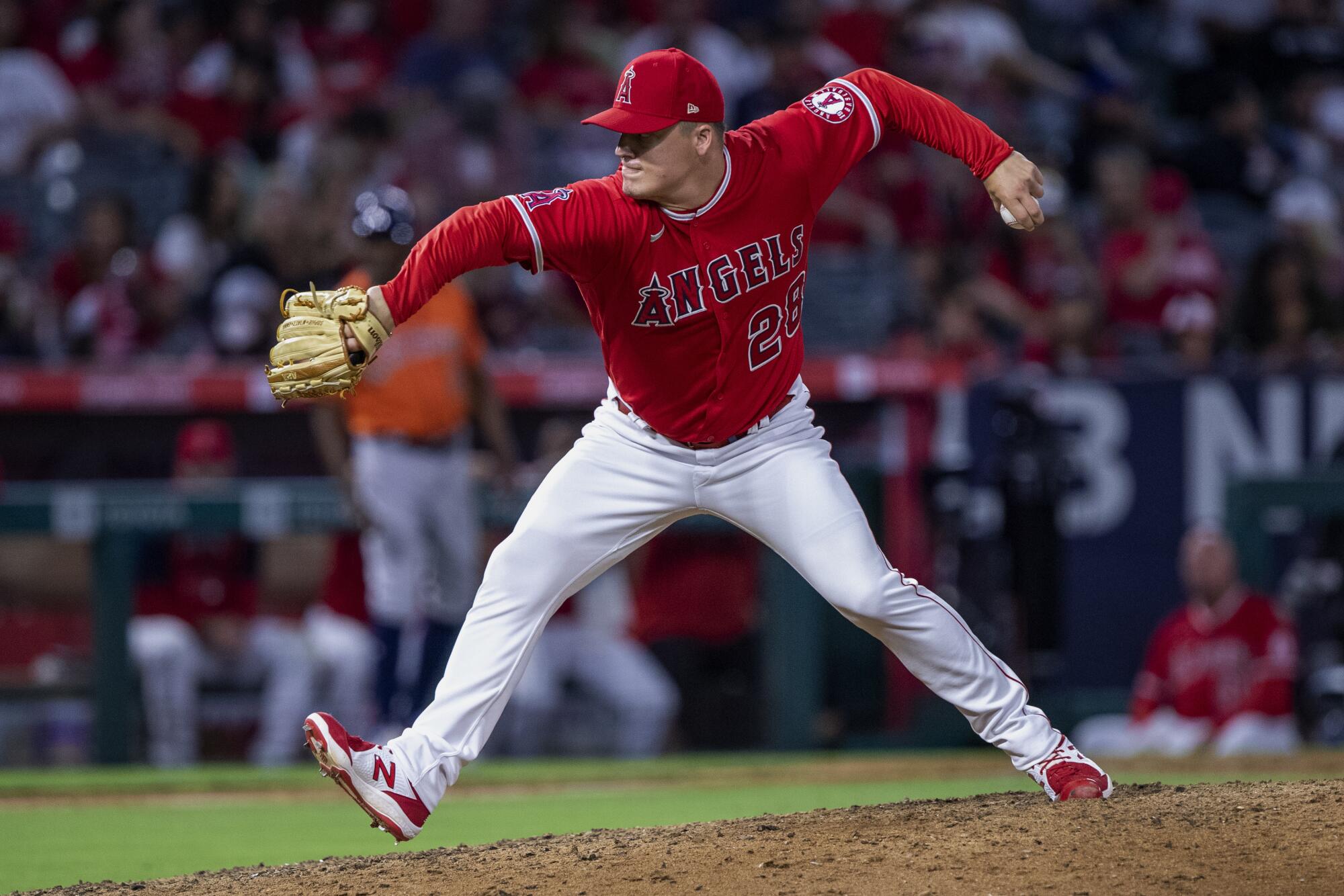
“It hasn’t been pretty to watch. And it hasn’t been fun to play because you’re going out and you’re losing on a regular basis. It sucks.”
— Jared Walsh
In 48 games since May 25, the Angels ranked 29th out of 30 teams in average (.212), runs (151), OPS (.620) and slugging percentage (.341). Only the woebegone Oakland Athletics are worse. The Angels are 6-17 in one-run games on the season.
The one constant throughout: a steady drumbeat of strikeouts. The Angels have a major league-high 900 whiffs, 243 of them looking. They tied a major league-record with 20 strikeouts in a nine-inning loss at Houston on July 3.
The discipline that helped fuel their strong start turned into passivity at the plate. The Angels, according to Baseball Savant, have a 26.3% chase rate, the sixth-lowest in baseball, but they have the third-highest whiff rate (27.5%) and a major league-worst 78.5% zone contact rate, which means they are not hitting enough pitches in the strike zone.
“I think if you look back to April, early May, our decision-making at the plate was significantly better,” general manager Perry Minasian said. “We were swinging at strikes and taking balls. We’ve probably gotten out of that a little bit more over the last month and a half. We’ve struggled hitting fastballs. That’s been an issue.
Cardinals pitcher Ryan Helsley, a member of Cherokee Nation, has said the chop chant at Braves games is disrespectful. Three years later, it’s still happening.
“The hitting coaches and players are working their tails off daily. But again, at the end of the day, this is the major leagues, we have to perform.”
The Angels thought a nasty benches-clearing brawl against the Seattle Mariners would unite them. “I think it flips a switch for us,” said reliever Andrew Wantz, whose wayward pitches sparked the fight.
It had the opposite effect. Reliever Archie Bradley broke his elbow when he fell over the dugout railing entering the fray. Their bullpen and coaching staff depleted by suspensions, the Angels lost 13 of their next 16 games.
“It hasn’t been pretty to watch,” Walsh said. “And it hasn’t been fun to play because you’re going out and you’re losing on a regular basis. It sucks.”
Now what?
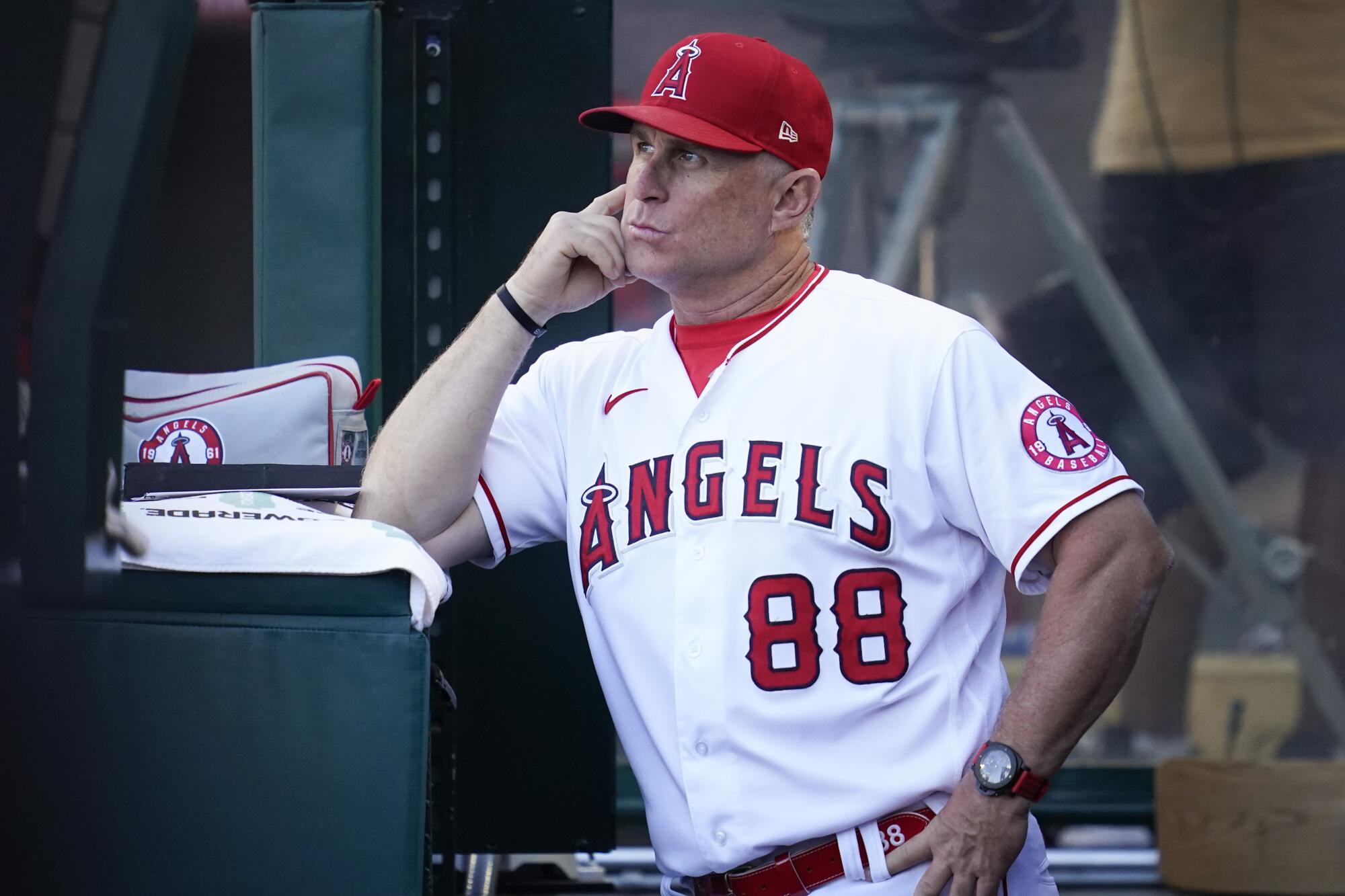
“You can’t just put your head down. We have 70 games left to get into a little rhythm and see where it goes.”
— Mike Trout, Angels center fielder
The Angels skidded into the break with a 39-53 (.424) record. Of the 120 teams that have had the same or lower winning percentage since the start of the wild-card era in 1995, only one has even reached .500.
The closest thing to a North Star for the Angels? The 1996 Red Sox, who entered the break at 36-49, thousandths of a point below the current Angels’ mark, before rallying for an 85-77 finish, three games out of the wild card.
Even if the Angels had the prospect capital to acquire a starter such as Cincinnati’s Luis Castillo and Oakland’s Frankie Montas, it wouldn’t make much sense to pursue such a starting pitcher before the Aug. 2 trade deadline.
The Angels appear too flawed, too thin and too far back in the standings to make a playoff run, and unlike every one of their previous six losing seasons, starting pitching hasn’t been the primary culprit — their 3.88 rotation ERA ranks 13th in baseball.
There has been heavy speculation about a possible trade of Ohtani, the two-way star and reigning AL most valuable player who will become a free agent after the 2023 season.
But a transaction complicated by the challenge of attaching a value on a player with such an unprecedented skillset would probably best be made during the offseason, without the pressure of a deadline.
The Angels, according to a person familiar with their finances, also generate roughly $10 million a year in Ohtani-related stadium advertising and marketing agreements and don’t relish the idea of losing that revenue. And owner Arte Moreno is loath to part with such a superstar and marquee gate attraction.
In a wide-ranging interview, MLB Commissioner Rob Manfred talks about baseball’s biggest issues, including the Angel Stadium saga and rising costs for fans.
About the best the Angels can do right now is fortify their thin farm system by trading some of their assets with value — Syndergaard, Lorenzen, Tepera — for prospects and retool over the winter in hopes of giving Trout and Ohtani one more season together to push the team into the playoffs.
It would also behoove them to give the erratic-fielding and streaky-hitting Adell, a 2017 first-round pick who signed for $4.3 million, regular playing time in the outfield to determine if he will be more of a big-league regular or busted prospect.
If the Angels continue on their current trajectory, they likely would start the winter in search of their fourth manager in five years since Mike Scioscia stepped down after 2018. Their entire coaching staff could be fired. The job of Minasian, in his second year of a four-year deal, could be in jeopardy.
They would also further sour Ohtani, who has made no secret of his desire to play in a World Series, on the idea of signing a long-term deal to remain in Anaheim.
“Obviously, it’s been frustrating, these last few weeks,” said Trout, who will open the second half on the injured list because of rib-cage inflammation. “We had a great start. We still have that same team, though losing Rendon was big.
“But we still have the second half of the season. You can’t just put your head down. We have 70 games left to get into a little rhythm and see where it goes.”
L.A. Times Studios vice president Christian Stone contributed to this report.
More to Read
Go beyond the scoreboard
Get the latest on L.A.'s teams in the daily Sports Report newsletter.
You may occasionally receive promotional content from the Los Angeles Times.

